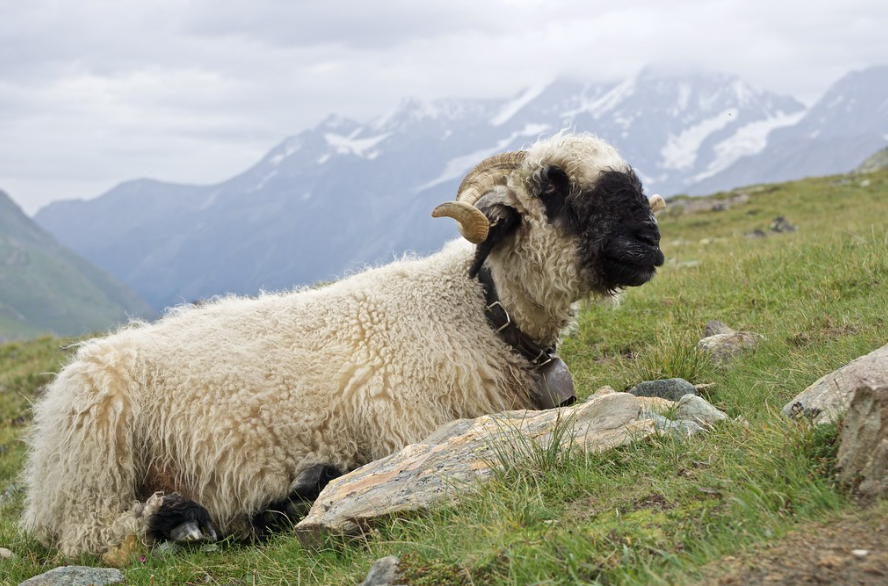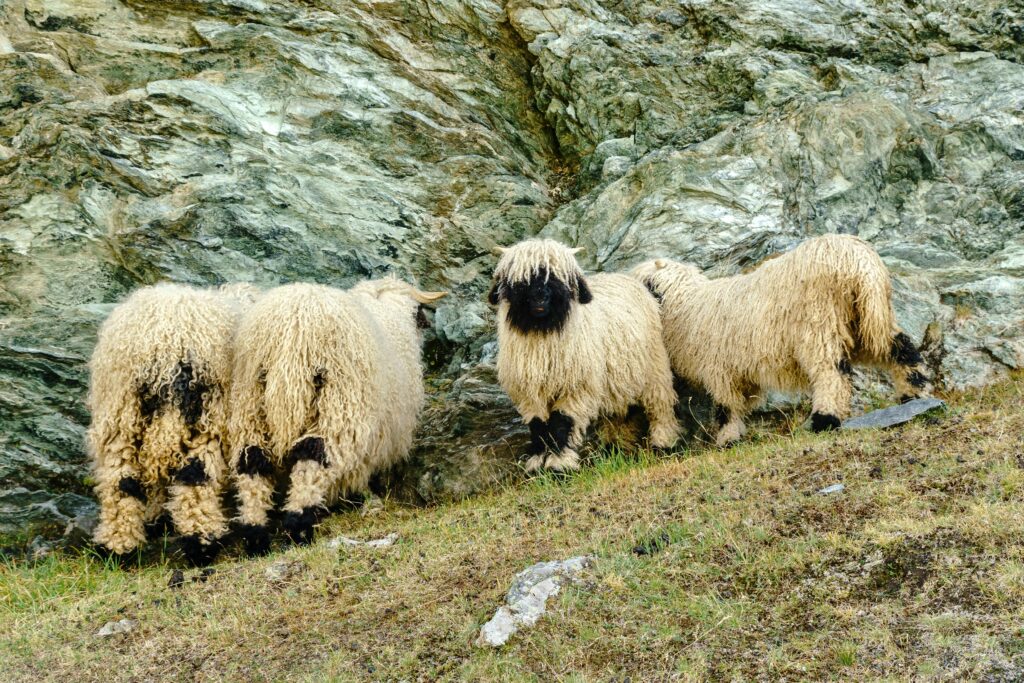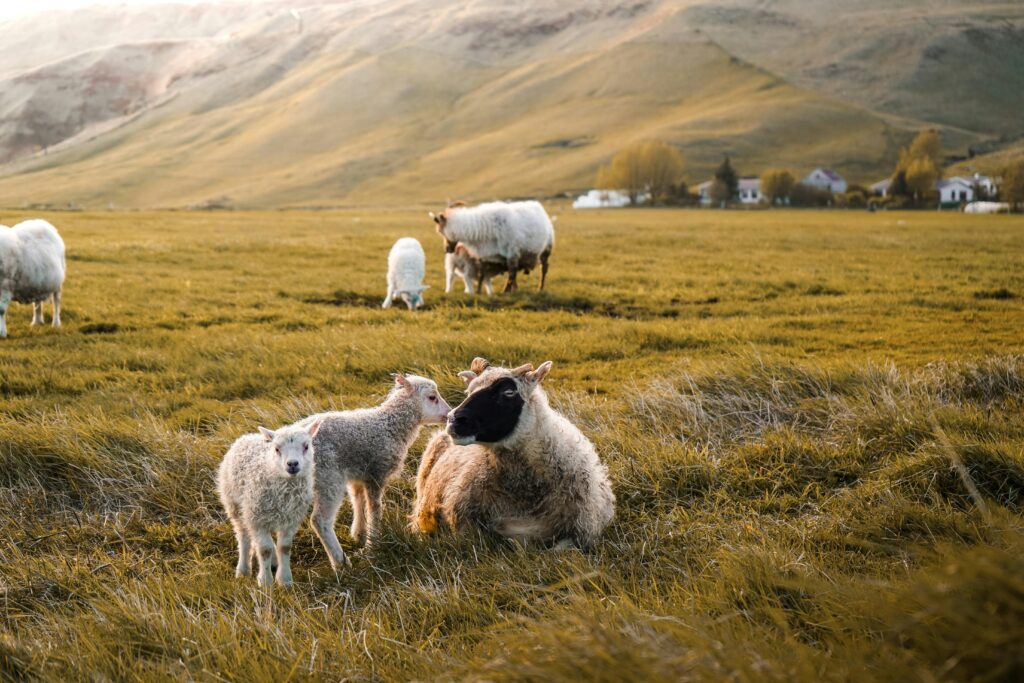
Discover the charm of Valais Black Nosed Sheep with this realistic farm animal toy for kids. Perfect for playtime and collectors alike!
Black Nose Sheep, known for their distinctive black faces and fluffy white wool, are one of the most charming breeds in the world of livestock. These adorable animals have captured the hearts of farmers, hobbyists, and social media enthusiasts alike. Whether you’re considering raising them or are simply curious about this unique breed, this guide will cover everything you need to know about Black Nose Sheep—from their history and characteristics to tips on care and why they’re a favourite on Instagram.
What Are Black Nose Sheep?
Originating from the Valais region in Switzerland, Black Nose Sheep, or Valais Blacknose Sheep, are a breed of domestic sheep known for their striking appearance. They are medium to large-sized animals with a predominantly white body and distinct black patches on their faces, ears, knees, and feet. Their curly wool gives them a teddy bear-like appearance, making them a favourite among sheep breeds for their cuteness and charm.
Why Are They So Popular?
Black Nose Sheep have skyrocketed in popularity for several reasons:
- Aesthetic Appeal: Their unique black-and-white markings and fluffy wool make them highly photogenic.
- Friendly Nature: Known as the “world’s cutest sheep,” they are friendly and great with children, making them ideal for petting zoos and hobby farms.
- Social Media Stars: Photos and videos of Black Nose Sheep often go viral, increasing their demand worldwide.
A Brief History of Black Nose Sheep
The Black Nose Sheep’s history dates back to the 15th century in the Swiss Alps. Originally bred for their resilience in harsh mountain climates, they were valued for their coarse wool and ability to thrive in challenging environments. Over time, their unique appearance gained recognition, and they transitioned from utility livestock to beloved pets and show animals.
Their Role in Swiss Culture
In Switzerland, Black Nose Sheep hold a special place in local traditions. They are celebrated in festivals and agricultural shows, where their beauty and quality are highlighted. These events have played a significant role in spreading their popularity to other countries.
Physical Characteristics
Appearance
Black Nose Sheep are immediately recognizable due to their:
- Black Markings: Their faces, ears, knees, and feet are jet black, contrasting sharply with their white wool.
- Curly Fleece: Their wool is dense, long, and coarse, often used in rugs and textiles.
- Spiral Horns: Both males and females typically have spiral-shaped horns, adding to their striking look.
Size
- Ewes: Weigh between 70-90 kilograms (154-198 pounds).
- Rams: Typically larger, weighing between 80-130 kilograms (176-286 pounds).
Temperament
Black Nose Sheep are known for their friendly and docile nature. They are social animals and enjoy the company of humans and other livestock, making them a joy to raise.

Care and Maintenance
Raising Black Nose Sheep requires a mix of basic livestock knowledge and specific attention to their unique needs. Here are some key aspects to consider:
1. Housing
Black Nose Sheep are hardy animals but still require adequate shelter, especially in extreme weather conditions. Provide a clean, dry space with proper ventilation to prevent respiratory issues.
2. Diet
- Pasture Grazing: Black Nose Sheep thrive on high-quality pasture. Ensure they have access to fresh grass and plants.
- Supplementary Feed: During winter or poor grazing conditions, supplement their diet with hay, grains, and mineral blocks.
- Hydration: Fresh, clean water should always be available.
3. Wool Maintenance
Their dense fleece requires regular care:
- Shearing: Shear them once a year to prevent overheating and matting.
- Checking for Parasites: Inspect their wool regularly for lice or mites.
4. Health Care
- Vaccinations: Ensure they are vaccinated against common sheep diseases.
- Hoof Trimming: Regularly trim their hooves to prevent infections.
- Worming: Administer worming treatments as part of a routine health care plan.
5. Social Needs
Black Nose Sheep are social creatures and should not be kept alone. A small flock of at least three is ideal to keep them happy and stress-free.
Breeding Black Nose Sheep
Breeding Black Nose Sheep can be a rewarding venture, whether for expanding your flock or selling lambs. Here are some tips:
- Mating Season: Typically occurs in autumn.
- Gestation Period: About 147 days (approximately five months).
- Lambing: Most ewes give birth to one or two lambs per season.
- Care for Lambs: Newborn lambs require close monitoring and may need bottle feeding if the ewe’s milk is insufficient.
Common Challenges
1. Health Issues
Black Nose Sheep are prone to common sheep ailments like foot rot, parasites, and respiratory issues. Regular health check-ups and preventive measures are essential.
2. Cost
Due to their popularity, Black Nose Sheep can be expensive to purchase and maintain. Rams can cost upwards of $5,000, while ewes are slightly less expensive.
3. Adaptation to Climate
While they are hardy, Black Nose Sheep may struggle in extremely hot climates. Proper shading and cooling measures are necessary in warmer regions.
Fun Facts About Black Nose Sheep
- They are often referred to as “teddy bear sheep” because of their fluffy appearance.
- Black Nose Sheep are highly photogenic and have been featured in calendars, advertisements, and even fashion shoots.
- Their wool is prized for its durability and is often used in crafting rugs and wall hangings.

Why Consider Raising Black Nose Sheep?
If you’re still on the fence about raising Black Nose Sheep, here are some compelling reasons:
- Aesthetics: They add a touch of beauty and uniqueness to any farm.
- Profitability: Their high value makes them a lucrative option for breeders.
- Low Maintenance: Despite their fluffy appearance, they are relatively easy to care for.
- Companionship: Their friendly demeanor makes them excellent companions.
Conclusion
Black Nose Sheep are more than just a pretty face; they are a versatile, resilient, and endearing breed. Whether you’re a seasoned farmer or a hobbyist looking to start a small flock, these sheep can bring joy, profit, and a touch of Swiss charm to your life. With proper care and attention, raising Black Nose Sheep can be a rewarding experience, both emotionally and financially.
So, are you ready to welcome the world’s cutest sheep into your life? Share your thoughts and experiences in the comments below!
Transform playtime with this amazingly realistic Valais Black-Nosed Sheep toy a must-have for every little farm animal fan – Click here!